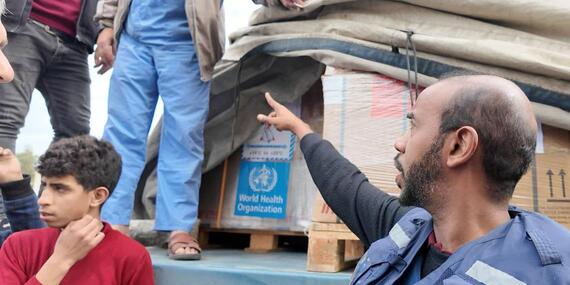Today's top news: Occupied Palestinian Territory, Ukraine, Congo

Occupied Palestinian Territory
With Gaza’s health care system hanging by a thread, OCHA says that aid organizations are doing all they can to provide life-saving medical assistance to civilians. Since the start of hostilities, more than two dozen humanitarian partners have established a presence on the ground in Gaza and provided health services to more than half a million people.
About a dozen emergency medical teams (EMTs) are working in Gaza, with two additional teams set to arrive next week. As of the end of this month, these EMTs have treated more than 12,400 patients needing emergency surgeries, as well as treatment for severe acute malnutrition and non-communicable diseases.
Meanwhile, hundreds of thousands of people in Gaza lack adequate shelter, and displaced communities urgently need shelter supplies to protect themselves from harsh weather. Over the course of last week, our humanitarian partners distributed more than 1,000 family tents in Khan Younis and Rafah for displaced people without shelter. They also provided more than 1,400 bedding items and 1,100 clothing kits to those displaced in Rafah.
Also last week, a dozen humanitarian partners provided some 1.7 million people across the Gaza Strip with at least one form of food assistance. Rafah Governorate received about half of the total food assistance; Deir al Balah received about a quarter; Khan Younis about 15 per cent; and the northern governorates about 10 per cent.
As we have said repeatedly, access to the north of Gaza is imperative to address the catastrophic food insecurity conditions of the population there.
Ukraine
In 2023, 11 million people in Ukraine received assistance including water and hygiene supplies, materials to repair homes, health or education services, food, cash assistance, as well as counselling, legal aid and demining.
Assistance to front-line communities was one of the top priorities, with 107 inter-agency convoys having delivered much-needed supplies to families severely impacted by the hostilities.
Humanitarian workers have also stepped in to support civilians facing freezing temperatures – which in Ukraine can drop to minus 20 degree Celsius. Our partners have provided nearly 1.7 million people with solid fuel to ensure heating in areas without power, gas or water, as well as winter clothes and thermal blankets. They also supported the insulation of homes and centres hosting displaced people.
We and our partners still face challenges to help people in areas occupied by Russia where humanitarian needs are dire and the response extremely limited.
Our humanitarian colleagues also noted that in 2023, indiscriminate attacks destroyed more than 55 aid facilities, killing at least 11 aid workers and injuring 35 in the line of duty.
This year, the UN and our partners seek US$3.1 billion to support 8.5 million people in Ukraine.
Congo
A new assessment indicates that more than 520,000 people need life-saving assistance following severe flooding in country.
A joint UN-Government assessment (19 to 24 January) found that nine of the country’s 12 departments are now affected, since the floods started in October. The Department of Likouala, in the north-east of the country, is the worst impacted, with nearly 350,000 people in need of humanitarian aid.
Access to areas affected by the flooding remains challenging. Many villages can only be reached by boat.
People affected have said their main needs are food, shelter and medical care.
The assessment also estimates that 5,000 hectares of land have been flooded.
The Government, with the support of UN agencies on the ground, is mobilized and providing food, emergency shelter and hygiene kits, among others. Medical teams have also been deployed for epidemiological surveillance and treatment.
The Emergency Relief Coordinator, Martin Griffiths, allocated $3.6 million from the Central Emergency Response Fund on 17 January to support the response.
